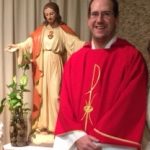
Question:
Answer:
St. Luke is traditionally believed to have been a Greek resident of Antioch (Eusebius, Church History III.4.7). St. Paul tells us that Luke was a physician (Col. 4:14). He joins one of St. Paul’s missionary trips in Acts (16:10-11) but is not described as having hands laid on him. His role appears to have been to be an evangelist, one who preaches the Gospel, but that is the limit to what he did. He does not appear to have played any kind of sacramental role or held any kind of church office.
St. Mark is traditionally believed to have been the John Mark referred to in Acts (12:12; 15:37) and the Mark referred to by St. Paul (Col. 4:10; 2 Tim. 4:11; Phil. 24) and St. Peter (1 Pt. 5:13). He is believed to have been a resident of Jerusalem who joined St. Paul in his preaching in Antioch. Acts refers to him as some kind of assistant to the Apostles (13:5) but does not specify further. His help to the Apostles must have been of great note because 1 Peter sends greetings on Mark’s behalf to other communities. Eusebius (Church History III.39) refers to him as St. Peter’s interpreter. He, much like St. Luke, is never described as having received the laying on of hands or holding any church office. Therefore he too is considered to have undertaken the role of evangelist but not Apostle or clergy.



